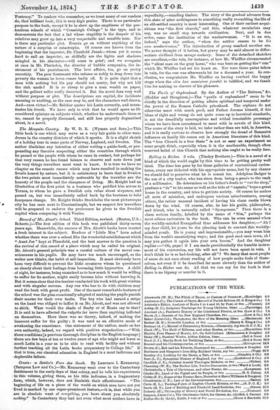Record of Mr. Alcott's School. Third Edition, revised. (Boston, U.S.:
Roberts.)—The first edition of this book was published thirty-seven years ago. Meanwhile, the success of Mrs. Alcott's books have created a fresh interest in the subject. Readers of "Littlo Men" have asked 'whether there was ever a school like the wonderful establishment which " Aunt Joe " kept at Plnmfield, and the best answer to the question is the revival of this record of a place which may be called its original. Mr. Alcott's general principle was a careful culture of the moral con- sciousness in his pupils. He may have too much encouraged, as the writer now thinks, the habit of self-inspection. It must obviously have been very difficult to prevent the little creatures whom he questioned so closely about their feelings from becoming little hypocrites. A child of eight, for instance, being examined as to how much it would be willing to suffer for its mother, might easily become false without knowing it. But it seems clear that the teacher conducted his work with great wisdom and with singular success. Any one who has to do with children may read the book with great profit. One of the most remarkable features of the school was the plan occasionally adopted of making the pupils punish their master for their owir faults. The boy who had earned a stripe on the hand was obliged to inflict it on Mr. Alcott, and was not allowed to shirk. What would the shade of Busby or of Keats say to that? It is said to have affected the culprits far more than anything inflicted on themselves. Here there was no theory, indeed, of making the innocent suffer for the guilty ; it was used as an effective mode of awakening the conscience. One statement of the author, made on her
own authority, indeed, we regard with positive stupefaction:" With these conditions [a previous thorough discipline in the English language] there are few boys of ten or twelve years of age who might not learn so much Latin in a year as to be able to read with facility and without further teaching all the Latin books preparatory to College life." If that is true, our classical education in England is a most ludicrous and deplorable failure.


































 Previous page
Previous page